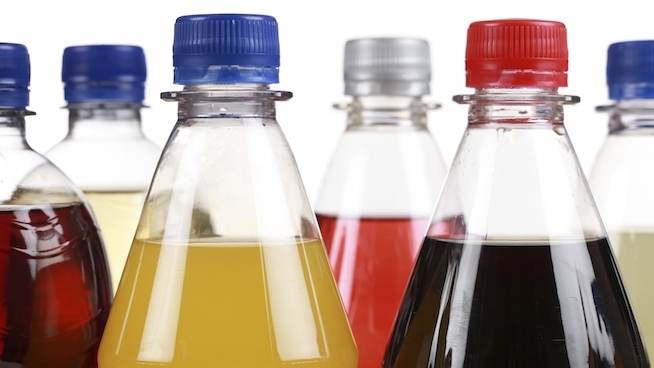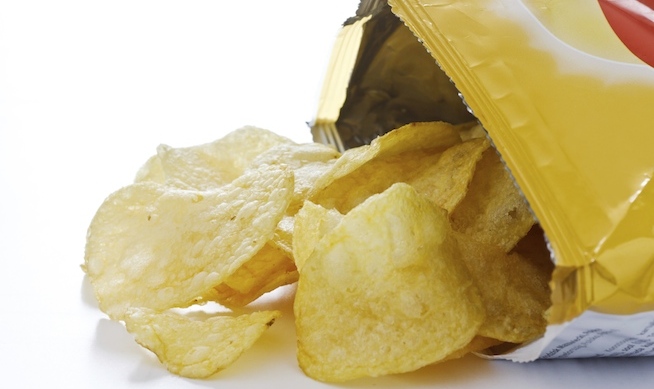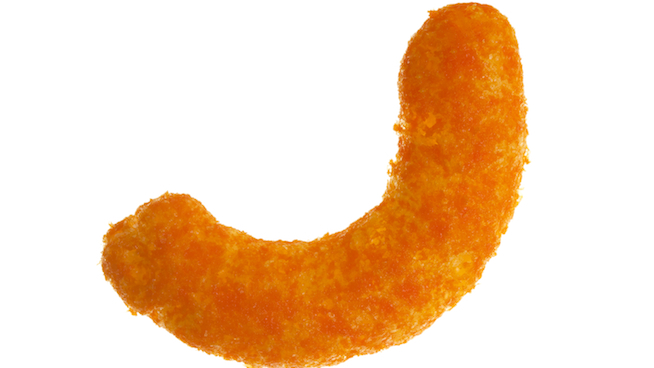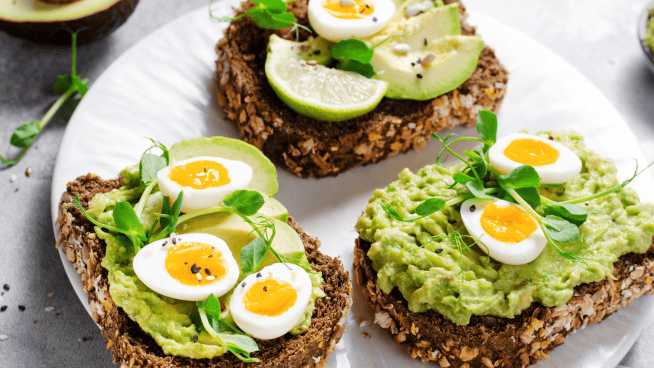The 6 Worst Foods for Athletes
Your practice sessions last an hour or two each day—a large chunk of time, for sure, but not quite as much as the hours available for you to sabotage your hard work. Because even if you bust your butt at practice, if you use other times during your day to pound down pizza, chicken wings and soda, you will undermine your performance.
As an athlete, you need to power your body with the right fuel—and steer clear of the wrong stuff. That’s why STACK reached out to some of the smartest experts in sports nutrition to identify the foods that can compromise your efforts. Although it’s OK to indulge in these items every now and then, they should be seen as “once in awhile” treats, not everyday eats. Here are the foods our experts identified as the five worst offenders, along with a smarter, healthier option for each.
Bacon
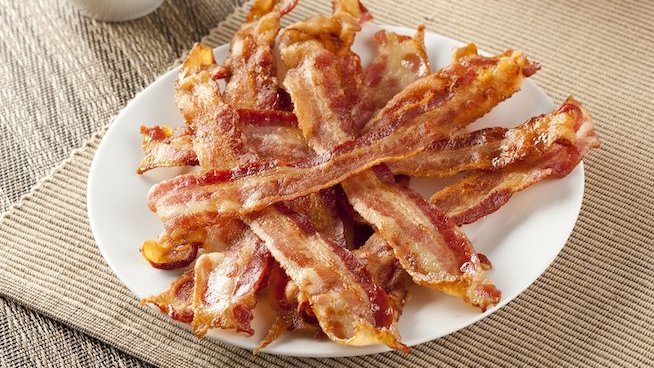
All Images: Thinkstock
That crispy, sizzling slice of meat sitting next to your eggs at breakfast is doing you no favors.
“Bacon has minimal protein, lots of saturated fat and minimal nutritional value,” says Leslie Bonci, RD, nutrition consultant to the Pittsburgh Pirates, Pittsburgh Steelers and other professional teams. “It’s also high in salt, which not all athletes need.”
Try this instead: Looking for a smoky flavor with your breakfast? “Turkey bacon, Canadian bacon, even a lean sausage will [be better options] per serving,” says Bonci.
Energy Drinks and Soda
Do you really think drinking something that looks like windshield wiper fluid is good for you? Come on.
“Sugar-sweetened beverages are something to keep to a minimum,” says Brian St. Pierre, sports dietitian and nutrition coach at Precision Nutrition. “They cause a tremendous amount of issues that can affect health, performance and body composition. Energy drinks usually also contain stimulants that provide short-term energy. Excess consumption could affect adrenal output and affect energy and athletic performance.”
What You Should Be Drinking: St.Pierre suggests coffee or tea if you really need a caffeine fix. “And if you want a sweetened drink, try fruit infused water—lemon, lime, strawberry, whatever have you,” St. Pierre says. “Many companies offer glass bottles with fruit infusers.”
Foods With Hydrogenated Oils & Trans Fats
These aren’t exactly foods. They’re ingredients—ones you should avoid at all costs. In fact, the FDA may eventually ban trans fats altogether. They took the first steps this past fall.
“Hydrogenated oils and trans fats are vegetable oils that have had a hydrogen molecule added to their chemical structure through a process called hydrogenation,” says Nate Miyaki, author of The Samurai Diet: The Science and Strategy of Winning The Fat Loss War. “This chemical alteration, however, is what makes these foods so problematic if you are an athlete. They’ve been shown to increase belly fat and abdominal obesity, and cause an inflammatory response in the body, which impairs optimal recovery.”
What You Should Be Eating: Miyaki suggests opting for monounsaturated fats. “You can replace hydrogenated vegetable oil with olive oil,” he says. And check the labels of what you eat to make sure trans fats aren’t hiding there.
Alcohol
This one is a no-brainer—especially if you’re under 21. “An occasional drink is fine for special occasions, but not when someone is serious about their training,” says Joy Dubost, RD. “Alcohol does not enhance a workout and provides seven calories per gram with little nutrition.”
You Should Be Drinking: More water. Dubost recommends water, tea, coffee, 100 percent juice or low-fat dairy. “Sports drinks can be used during physical activity lasting more than an hour, but that really depends on the individual needs of the person,” she adds.
Cheese Puffs

Fried corn meal (what these tasty little puffs are made of) and a cheesy coating should not be a staple in any athlete’s diet. While some of them tout real cheese dust, others achieve that salty taste by using something else.
What You Should Be Eating: You can still get that satisfying crunch—just get it from a snack with some nutritional value. Try tortilla chips. “Corn tortillas provide whole grains and calcium, and are great dipper to use with salsa,” says Bonci. “Even popcorn with a little Parmesan on it provides the fill and fiber without the fat.”
Grain-based desserts
We’re talking about things like cakes, cookies, pastries, those sponge cakes with the crème filling—y’know, all the stuff you know is bad. “They’re one of the top sources of added sugar and saturated fat in the diet,” says Dubost.
What You Should Be Eating: Plenty of sweet treats are not totally nutritionally useless. “How about an apple cobbler or an oatmeal cookie,” Bonci says. “Forgo all the unnecessary add-ins and packaged stuff.”
Read More:
- 5 Filling, Healthy Snacks to Boost Performance
- How to Eat What You Want and Still Lose Weight
- Beyond Weight Loss: 4 Reasons to Eat Healthy
RECOMMENDED FOR YOU
The 6 Worst Foods for Athletes
Your practice sessions last an hour or two each day—a large chunk of time, for sure, but not quite as much as the hours available for you to sabotage your hard work. Because even if you bust your butt at practice, if you use other times during your day to pound down pizza, chicken wings and soda, you will undermine your performance.
As an athlete, you need to power your body with the right fuel—and steer clear of the wrong stuff. That’s why STACK reached out to some of the smartest experts in sports nutrition to identify the foods that can compromise your efforts. Although it’s OK to indulge in these items every now and then, they should be seen as “once in awhile” treats, not everyday eats. Here are the foods our experts identified as the five worst offenders, along with a smarter, healthier option for each.
Bacon

All Images: Thinkstock
That crispy, sizzling slice of meat sitting next to your eggs at breakfast is doing you no favors.
“Bacon has minimal protein, lots of saturated fat and minimal nutritional value,” says Leslie Bonci, RD, nutrition consultant to the Pittsburgh Pirates, Pittsburgh Steelers and other professional teams. “It’s also high in salt, which not all athletes need.”
Try this instead: Looking for a smoky flavor with your breakfast? “Turkey bacon, Canadian bacon, even a lean sausage will [be better options] per serving,” says Bonci.
Energy Drinks and Soda
Do you really think drinking something that looks like windshield wiper fluid is good for you? Come on.
“Sugar-sweetened beverages are something to keep to a minimum,” says Brian St. Pierre, sports dietitian and nutrition coach at Precision Nutrition. “They cause a tremendous amount of issues that can affect health, performance and body composition. Energy drinks usually also contain stimulants that provide short-term energy. Excess consumption could affect adrenal output and affect energy and athletic performance.”
What You Should Be Drinking: St.Pierre suggests coffee or tea if you really need a caffeine fix. “And if you want a sweetened drink, try fruit infused water—lemon, lime, strawberry, whatever have you,” St. Pierre says. “Many companies offer glass bottles with fruit infusers.”
Foods With Hydrogenated Oils & Trans Fats
These aren’t exactly foods. They’re ingredients—ones you should avoid at all costs. In fact, the FDA may eventually ban trans fats altogether. They took the first steps this past fall.
“Hydrogenated oils and trans fats are vegetable oils that have had a hydrogen molecule added to their chemical structure through a process called hydrogenation,” says Nate Miyaki, author of The Samurai Diet: The Science and Strategy of Winning The Fat Loss War. “This chemical alteration, however, is what makes these foods so problematic if you are an athlete. They’ve been shown to increase belly fat and abdominal obesity, and cause an inflammatory response in the body, which impairs optimal recovery.”
What You Should Be Eating: Miyaki suggests opting for monounsaturated fats. “You can replace hydrogenated vegetable oil with olive oil,” he says. And check the labels of what you eat to make sure trans fats aren’t hiding there.
Alcohol
This one is a no-brainer—especially if you’re under 21. “An occasional drink is fine for special occasions, but not when someone is serious about their training,” says Joy Dubost, RD. “Alcohol does not enhance a workout and provides seven calories per gram with little nutrition.”
You Should Be Drinking: More water. Dubost recommends water, tea, coffee, 100 percent juice or low-fat dairy. “Sports drinks can be used during physical activity lasting more than an hour, but that really depends on the individual needs of the person,” she adds.
Cheese Puffs

Fried corn meal (what these tasty little puffs are made of) and a cheesy coating should not be a staple in any athlete’s diet. While some of them tout real cheese dust, others achieve that salty taste by using something else.
What You Should Be Eating: You can still get that satisfying crunch—just get it from a snack with some nutritional value. Try tortilla chips. “Corn tortillas provide whole grains and calcium, and are great dipper to use with salsa,” says Bonci. “Even popcorn with a little Parmesan on it provides the fill and fiber without the fat.”
Grain-based desserts
We’re talking about things like cakes, cookies, pastries, those sponge cakes with the crème filling—y’know, all the stuff you know is bad. “They’re one of the top sources of added sugar and saturated fat in the diet,” says Dubost.
What You Should Be Eating: Plenty of sweet treats are not totally nutritionally useless. “How about an apple cobbler or an oatmeal cookie,” Bonci says. “Forgo all the unnecessary add-ins and packaged stuff.”
Read More:
- 5 Filling, Healthy Snacks to Boost Performance
- How to Eat What You Want and Still Lose Weight
- Beyond Weight Loss: 4 Reasons to Eat Healthy

